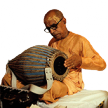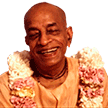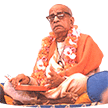Those who are in Kṛṣṇa consciousness are naturally reluctant to engage in material sense gratification. But those who are not in such consciousness should follow the rules and regulations of the revealed scriptures. Unrestricted sense enjoyment is the cause of material encagement, but one who follows the rules and regulations of the revealed scriptures does not become entangled by the sense objects. For example, sex enjoyment is a necessity for the conditioned soul, and sex enjoyment is allowed under the license of marriage ties. According to scriptural injunctions, one is forbidden to engage in sex relationships with any women other than one's wife.
Srila Prabhupada's books, lectures, conversations and letters offer a comprehensive presentation of this essential subject as seen in the Vaniquotes Sense Objects category. An introduction from his books is given below in the following 8 quotes.
Quotes from Srila Prabhupada's books

vanipedia.org
|
The five great elements, false ego, intelligence, the unmanifested, the ten senses and the mind, the five sense objects, desire, hatred, happiness, distress, the aggregate, the life symptoms, and convictions—all these are considered, in summary, to be the field of activities and its interactions. From all the authoritative statements of the great sages, the Vedic hymns and the aphorisms of the Vedānta-sūtra, the components of this world can be understood as follows. First there are earth, water, fire, air and ether. These are the five great elements (mahā-bhūta). (Bhagavad-gītā 13.6-7)
|

vanipedia.org
|
The living entities are merged into the air of life, which acts in different ways for circulation. There is prāṇa, apāna, udāna, vyāna and samāna, and because the life air functions in this fivefold way, it is compared to the five-hooded serpent. The soul passes through the kuṇḍalinī-cakra like a serpent crawling on the ground. The life air is compared to uraga, the serpent. Pañca-vṛtti is the desire to satisfy the senses, attracted by five sense objects—namely form, taste, sound, smell and touch. (Śrīmad-Bhāgavatam 4.29.6)
|

vanipedia.org
|
Human civilization is meant for purifying the senses, and objects of sense satisfaction should be supplied as much as absolutely required, but not for aggravating artificial sensory needs. Food, shelter, defense and sense gratification are all needs in material existence. Otherwise, in his pure, uncontaminated state of original life, the living entity has no such needs. The needs are therefore artificial, and in the pure state of life there are no such needs. As such, increasing the artificial needs, as is the standard of material civilization, or advancing the economic development of human society, is a sort of engagement in darkness, without knowledge. (Śrīmad-Bhāgavatam 2.5.30)
|

vanipedia.org
|
According to Sāṅkhya philosophy, the material cosmos is composed of twenty-four elements: the five gross material elements, the three subtle material elements, the five knowledge-acquiring senses, the five active senses, the five objects of sense pleasure, and the mahat-tattva (the total material energy). Empiric philosophers, unable to go beyond these elements, speculate that anything beyond them must be avyakta, or inexplicable. But the world beyond the twenty-four elements is not inexplicable, for it is explained in the Bhagavad-gītā as the eternal (sanātana) nature. (Caitanya-caritāmṛta, Ādi-līlā 5.14)
|
Sense Objects - explore more within this category.
Vanipedia has now over 903 introductory articles compiled from Srila Prabhupada's books under the series titled Essential Subjects. All these articles can be seen in the Table of Content on the right side of this article and also here in this Umbrella Category.
Browse through them to relish the breadth and depth of Srila Prabhupada's teachings - There is a subject for everyone.
| |
|
| |
HOME
Choose Another
Essential Subject
|
| |
|







